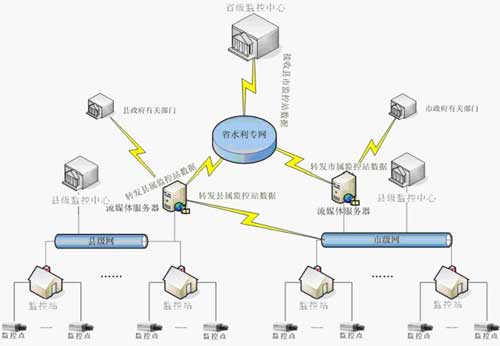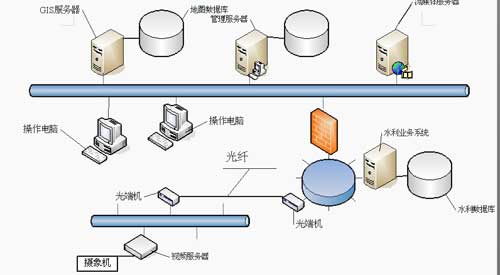1、 Introduction
2、 System introduction
2.1 selection of monitoring points
2.2 overall system structure
2.3 key points in project implementation
2.3.1 equipment selection requirements
2.3.2 lightning protection requirements
2.3.3 construction of monitoring center
3、 Software platform
3.1 software system architecture
3.2 main features of software
3.2.1 integration of video monitoring with water, rain and engineering database
3.2.2 water level alarm linkage
3.2.3 video effect suitable for application in water conservancy industry
3.2.3.1 low delay video
3.2.3.2 preset bit setting
3.2.3.3 watershed monitoring
3.2.3.4 hierarchical monitoring
3.2.4 vector electronic map
3.2.5 self defined water conservancy events
4、 Application Benefit
4.1 flood control and disaster relief and water resources management
4.2 water pollution treatment
4.3 shipping management
5、 Outlook and summary
5.1 wireless monitoring system
5.2 intelligent identification and detection
5.3 conclusion
1、 Introduction
Water conservancy is the basic industry of the national economy. China has a vast territory and a wide distribution of water resources. There are many rivers, lakes, reservoirs and auxiliary dams, gates and culverts. To manage and make good use of these water resources and water conservancy facilities, and achieve the combination of daily management, flood control command, flood fighting and rescue, remote dispatching, detection and maintenance are essential, These are the main contents of water conservancy informatization, that is, digital water conservancy, and important measures to drive water conservancy modernization.
In the construction of digital water conservancy system, the water conservancy department collects data through digital camera, measurement, remote sensing, geographic information system and GPS, processes, stores and uses the data through optical cable, satellite, microwave and other transmission methods, so as to establish an information system covering the whole river basin, The water conservancy video monitoring system discussed in this paper is not only an important part of digital water conservancy, but also a hot spot and highlight in the construction of digital water conservancy system in the near future. Through the system, the staff can monitor the situation of various water conservancy facilities in real time in the monitoring center or working computer, and observe the current situation of water resources in real time, which greatly improves the work efficiency; At the moment of flood fighting and disaster relief, remote observation and command can be realized through this system, especially in some areas where personnel are difficult to reach due to adverse weather conditions, the system plays an irreplaceable role.
Beijing Juying soar Electronics Co., Ltd. has participated in the construction of multiple video monitoring systems in the water conservancy industry in recent years, and has accumulated rich experience in system design and application. In particular, it has formed significant characteristics in the development of water conservancy video monitoring software, which has been recognized and praised by the leaders of the water conservancy department. And there are a large number of ready-made cases, not only water conservancy, oil fields, coal mines, Internet of vehicles, urban planning and so on. It shall be used together with RTU and DTU. This paper will focus on the design and application of water conservancy video monitoring system software platform combined with the established system.
2、 System introduction
2.1 selection of monitoring points

The video monitoring system of water conservancy project shall reasonably select the monitoring points according to the characteristics of different monitoring objects such as reservoirs, gate stations, seawalls, flood diversion and detention areas and important flow measurement sections, taking into account flood control and project management. The layout of monitoring points shall meet the effective observation of the following monitoring objects:
Reservoir: dam, spillway, sluice gate, spillway tunnel and water level gauge;
Gate station: main body of gate station building, gate, upstream (downstream) water area, embankment and water level gauge;
Embankment: embankment top, pavement and nearby waters;
Flood diversion and detention area: flood diversion gate and blasting point;
Important flow measurement sections: water area and water level gauge;
Safe haven: water area.
2.2 overall system structure
Water conservancy video monitoring system (I) [example of complete solution]
In the figure above, we divide the whole system into three levels. The first level is the provincial monitoring center, the second level is the monitoring center of each county and city, and the third level is each large and medium-sized reservoir and water conservancy project facility management office (monitoring station) and each monitoring point under its jurisdiction, which is also in line with the characteristics of segmented management and unified coordination of water conservancy industry.
The video connection between the monitoring point and the monitoring station can adopt the analog transmission mode, transmit the analog signal to the monitoring station through cable or optical fiber, and then conduct digital compression in the monitoring station, or digitally compress the video signal directly at the monitoring point and upload it to the monitoring station through the network.
Each monitoring station, county and city monitoring center and provincial monitoring center are connected through the water conservancy private network. Compressed video packets are forwarded or distributed to the client through the streaming media server on the network. Users realize monitoring operations through the client. The above operations are under the jurisdiction of the management server of each county, City and provincial monitoring center.
The management server and streaming media server can realize multi server cascade, so as to form a video monitoring system covering the whole province.
If conditions permit, the video signal of the monitoring point can also be transmitted to the monitoring center of each county and city through optical fiber in an uncompressed way. At this time, the full real-time uncompressed video can be seen in each monitoring center, which has better effect and higher cost.
2.3.1 key points in project implementation
This paper mainly introduces the application of water conservancy video monitoring software platform, and only introduces several key points in the implementation of the project.
Equipment selection requirements
High definition and low illumination cameras should be selected at the monitoring site. Generally, integrated spherical cameras can be selected. If infrared mode is considered as the means of night monitoring, gun cameras with color to black function should be considered. Due to the wide coverage of water conservancy projects, high magnification cameras should be selected to meet the requirements of wide-range monitoring.
As the core coding equipment, it is recommended to use video server to realize real-time video transmission in water conservancy projects to meet the requirements of low delay. At the same time, it can also be equipped with hard disk video recorder to realize video backup.
Water conservancy video monitoring projects are often built in the wild, and the weather conditions are bad. Especially in the flood fighting and disaster relief time when the system is most frequently used, there are often severe weather conditions such as strong wind and heavy rain. The selected cameras and other outdoor equipment must be able to be used in harsh environments such as rain and corrosion prevention, and the requirements of typhoon resistance must be considered for supports and poles.
In the existing water conservancy projects, many lighting systems are not installed, and the night is often the key time of flood fighting and disaster relief. Therefore, the requirements of night monitoring should be fully considered in the system design, and the night monitoring should be realized by lighting or infrared light.
2.3.2 lightning protection requirements
Water conservancy projects are often built in open places in the field, which are easy to be attacked by lightning. The power supply of the equipment at the monitoring point is generally taken near the site, and it is also easy to be affected by lightning waves to produce high voltage and surge current. In order for the equipment to operate reliably and for a long time, the camera rod and front-end chassis must be grounded; The video signal of the camera shall be equipped with lightning protection equipment to prevent the damage of lightning to the camera and other equipment; Each monitoring station shall be equipped with power surge protector to prevent the invasion of lightning.
2.3.3 construction of monitoring center
The monitoring center shall ensure that a mature and reliable network system is adopted, and the computer hardware equipment used to install the server software must be stable and reliable. At the same time, full consideration shall be given to the cooperative work and equipment reuse with the video consultation system to realize the organic combination of the monitoring system and the consultation system.
3、 Software platform
3.1 software system architecture

The software system is mainly composed of management server software, client software and streaming media server software, and supports C / s and B / s modes. The main architecture of the software system is shown in the figure below
Water conservancy video monitoring system -- software system architecture
The management server software mainly completes the parameter attribute setting of hard disk video recorders and video servers, the permission setting of users, groups and roles, the management of daily log files, as well as data backup and restore processing within the jurisdiction.
The streaming media server software realizes the forwarding, distribution and flow control of audio and video streams. The network interconnection part of each county and city often has low bandwidth, which is easy to cause congestion. The system will be equipped with corresponding streaming media server to realize data forwarding to reduce the data flow between networks and prevent the generation of network bottlenecks. The server can be cascaded according to the network topology.
Install the client software on the user's operating computer to monitor and control the monitoring points, and realize the video recording, alarm and management functions at the same time. The user can also directly realize the basic functions of the software through IE browsing without installing any software, that is, realize the monitoring in B / S mode.
The GIS Server provides the corresponding map data, and the software combines the vector electronic map through the server. The water conservancy department provides the development interface for the water conservancy database and the corresponding water conservancy business system. The software obtains the water, rain and work information through the database, and then realizes the linkage with the water, rain and work information.
3.2 main features of software
As a set of platform software, of course, it should have the basic functions of video monitoring, such as monitoring, video recording, management and so on. The above functions are discussed in detail in many documents. The author will not repeat them. The following focuses on the development and design according to the characteristics of the water conservancy industry.
Continued below: 3.2 main features of the software IV. application benefits v. prospect and summary

 Manager Wang
Manager Wang
 OfficialAccounts
OfficialAccounts